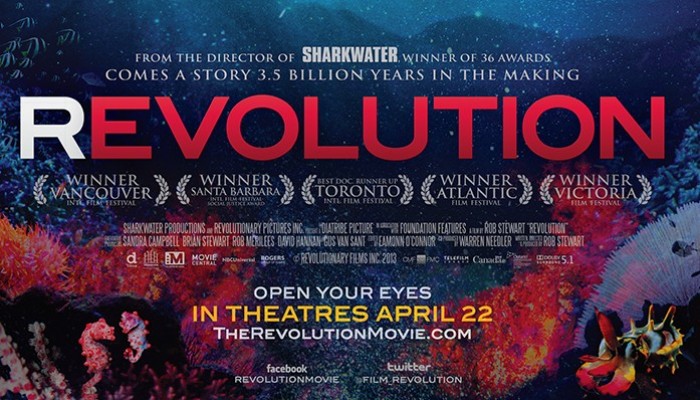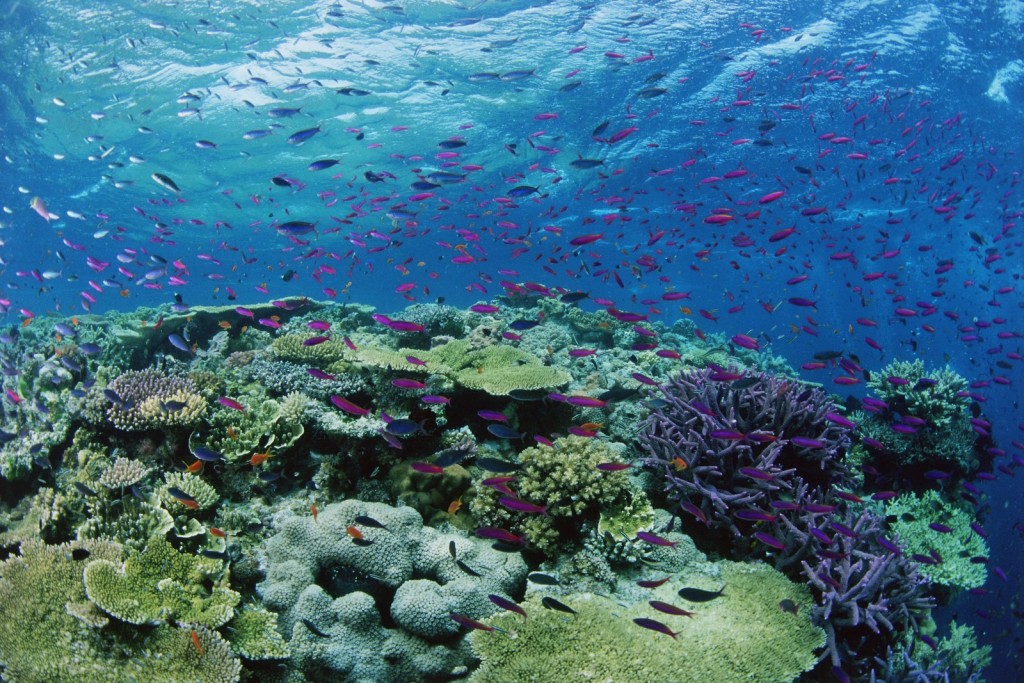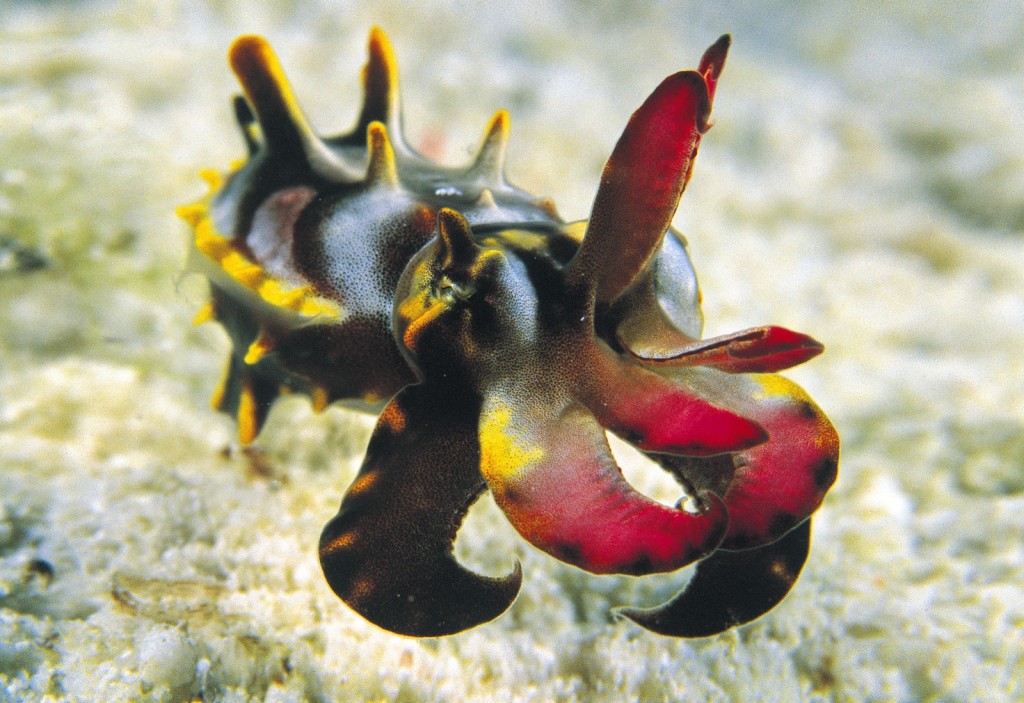
It’s not every day you are asked to review a film, and since it’s a documentary that encompasses a few of EGU’s sciences (such as climate sciences, biogeosciences, and energy, resources and the environment), I couldn’t say no. I’ll start by giving it a rating, 3.5/5 stars, though I would probably give it more if I were part of the film’s main target audience.
Revolution, by biologist-photographer turned filmmaker-conservationist Rob Stewart, is about some of the most pressing environmental issues of our time. It aims to educate the audience about ocean acidification, climate change, overfishing and deforestation, alerting them to how these issues can impact our planet and, in turn, humanity. But it’s also about much more than that.
The film starts with Stewart telling his own story, revealing how his personal experiences lead him to make his first documentary, Sharkwater, and how researching and promoting that film made him want to tell the broader story of Revolution. This makes for good story telling, and it’s an interesting and candid introduction (Stewart says at one point that he had no idea how to make a movie before Sharkwater). But it seems a tad overly dramatic at times and not always scientific in its claims. For example, to illustrate how humans, responsible for many environmental problems, can also be part of their solution, Stewart tells a crowd in Hong Kong that the “holes in the ozone layer are almost a figment of our imagination now”, which is not exactly true. According to a 2014 NASA release, the ozone hole is still roughly the size of North America, though it has been shrinking over the past couple of decades. I should point out, however, that while there are some minor scientific inaccuracies here and there in the film (and a glaring typo in a sentence where CO2 appears incorrectly written as CO2) the majority of the facts and figures cited in the movie do roughly seem to be accurate, even if rather dramatic and seemingly exaggerated at first.
The movie becomes more exciting (though, at times, depressing too) when Stewart changes the focus from his story to the story of how life evolved on Earth, and what its future might look like. The backdrop is beautiful footage, worthy of a BBC wildlife programme. Stewart starts where life itself started, underwater, and the images showing a diversity of corals and colourful fish (and the cute pigmy sea horse) are breath-taking and work well in illustrating his points. For example, as the colourful imagery gives place to shades of grey, Stewart describes and shows how corals have been affected by ocean acidification and rising temperatures.

Coral cover on the Great Barrier Reef has declined by 36% over the last 25 years. That’s an enormous loss. Photo © Rob Stewart. From the documentary film Revolution.
If the footage, both underwater and on land, makes for a stunning background, the interviews with various scientific experts bring home the film’s key messages. To me, they are the strongest aspect of Revolution. Stewart talks to credible researchers who are able to communicate their, often complex, science in clear language. Some of the readers of this blog may be able to relate to scientists Charlie Veron and Katharina Fabricius, whose field work is shown in the film, while viewers less familiar with the effects of ocean acidification on coral reefs will likely be moved by the dramatic words of these researchers.
What the scientists tell us will happen if humans continue in the business-as-usual path is indeed gloomy: deforestation increasing, fisheries collapsing, greenhouse gas emissions and temperatures on the rise at unprecedented rates, species going extinct en masse… the list goes on. The issues of deforestation and mass extinction are addressed when Stewart travels to Madagascar: the island’s tropical dry forests are home to unique animals and plants, many of which have seen their habitats destroyed by the burning of trees to make room for pastures and crops. Humanity’s dependence on fossil fuels is illustrated when Stewart talks about the Alberta tar sands, and how resource intensive and polluting it is to extract oil from them. A key message of the film is again illustrated here by one of the experts interviewed. Hans Joachim (‘John’) Schellnhuber, a scientific advisor to the German Government and director of the Potsdam Institute for Climate Impact Research, explains how stopping the Canadian tar sands project “is one of the decisive battles in the war against global warming”.
Indeed, Stewart sets out not only to inform people about the environmental issues faced by humanity, but also to encourage the audience to act on them: “Revolution is not just about the environment – it’s a film about hope and inspiration.” As such, Stewart balances out this negative outlook with examples of people who are standing up for climate justice and fighting for an end to fossil-fuel burning (and, sometimes, with clips of flamboyant cuttlefish and jumping lemurs!). Although it may not seem like it halfway through the film, the overall message is positive.
This is most evident when Stewart talks to young people, particularly those who travelled to Cancun, Mexico for the United Nations Climate Change Conference in 2010 (COP16). It is heartening to find out how committed and courageous some young people are in fighting for our future, their future, and in wanting to make the Earth a better place by changing human behaviour. This fighting spirit is best encapsulated in a speech by Mirna Haider, from the COP16 Lebanon Youth Delegation, which is particularly bold and moving, if impatient: “You have been negotiating all my life, you cannot tell me you need more time.”
Young people are those who may have the most to benefit from watching this film, and I think are the primary target audience of Revolution (there’s even an accompanying Educator’s guide with pre- and post-viewing resources and classroom activities teachers and parents might find useful). It inspires them towards (peaceful) revolution against corporations who profit from burning fossil fuels and from destroying natural resources, and against governments who take no action to stop them. It is a shame the film doesn’t address other ways in which individuals could help fight climate change, deforestation and ocean acidification, such as divesting from fossil fuels or eating less meat. But perhaps that’s something that resonates better with older people. Children and teenagers tend to be more optimistic about their power to save the Planet through revolution, and this film is sure to inspire them to act on the most pressing environmental problems the Earth faces.
Revolution premiered at festivals in 2012/2013, but has only been widely released earlier this year. You can watch the film online on the Revolution website, or through the platforms indicated there (sadly, it’s not free, but you can either rent it or buy it for only a few dollars, so it’s certainly affordable!).
By Bárbara Ferreira, EGU Media and Communications Manager

